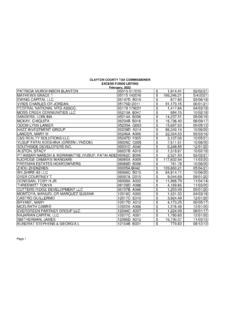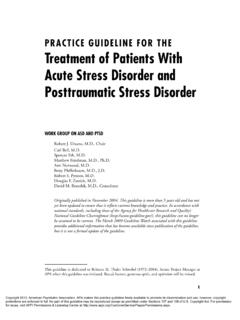Transcription of The McMillan Sisters, The Roots of the Open-Nursery, and ...
1 Instructions for authors, subscriptions and further details: The McMillan sisters , The Roots of the open - nursery , and breaking the cycle of Poverty Betty Liebovich1 1) Goldsmith. University of London (United Kingdom) Date of publication: February 23rd, 2018 Edition period: February 2018 June 2018 To cite this article: Liebovich, B. (2018). The MacMillan sisters , the Roots of the open - nursery , and breaking the cycle of poverty. Social and Education History, 7(1), 78-96. To link this article: PLEASE SCROLL DOWN FOR ARTICLE The terms and conditions of use are related to the open Journal System and to Creative Commons Attribution License (CC-BY).
2 HSE Social and Education History No. 1 February 2018 pp. 78-96 2018 Hipatia Press ISSN: 2014-3567 DOI: The McMillan sisters , the Roots of the open - nursery , and breaking the cycle of Poverty Betty Liebovich Goldsmith. University of London (United Kingdom) Abstract _____ This article explores the impetus and motivation for the McMillan sisters , Christian Socialists committed to creating change for the working class in England, to create an innovative and enduring ideal of nursery education through the open -air nursery . Influenced by their membership in the Fabian Society and the Independent Labour Party, they created health and dental clinics for people living in deprivation in Yorkshire and East and South East London, England, campaigned for the 1906 Provision of School Meals Act, and created night camps for deprived children in Deptford in night camps were the inspiration for educating young children and in March 1914, the open -air nursery opened for the youngest children living in the tenements of Deptford.
3 Using archival methods, the conclusion is reached that the McMillan sisters , and Margaret specifically, worked tirelessly to create social change through the open -air nursery serving the deprived surrounding community. By modelling good practice, both educationally and hygienically, they hoped to make a difference in the lives of families stuck in a cycle of poverty. The enduring work and ideas formulated in this nursery have informed many initiatives focused upon reducing social disadvantage, to include the UK framework Every Child Matters . _____Key words: open -air nursery , young children, deprivation, social reform HSE Social and Education History No.
4 1 February 2018 pp. 78-96 2018 Hipatia Press ISSN: 2014-3567 DOI: Las hermanas McMillan , los Or genes de la Guarder a al Aire Libre y la Ruptura del Ciclo de Pobreza Betty Liebovich Goldsmith. University of London (United Kingdom) Abstract _____ Este art culo explora el mpetu y la motivaci n de las hermanas McMillan , socialistas cristianas comprometidas con el cambio para la clase trabajadora en Inglaterra, para crear un ideal innovador y perdurable de educaci n infantil a trav s de la guarder a al aire libre. Influenciadas por su vinculaci n a la Sociedad Fabiana y al Partido Laborista Independiente, crearon cl nicas de salud y odontol gicas para personas en situaciones de pobreza en Yorkshire y en Londres; hicieron campa a para la Ley de Comidas Escolares de 1906 y crearon campamentos para menores desfavorecidos.
5 Los campamentos fueron la inspiraci n para educar a ni os peque os y en 1914 se abri la guarder a al aire libre para menores que viv an en apartamentos de alquiler en Deptford. Utilizando m todos de archivo, se concluye que las hermanas McMillan , y espec ficamente Margaret, trabajaron incansablemente para generar un cambio social a trav s de la guarder a al aire libre, la cual prestaba servicios a la comunidad desfavorecida de su entorno. Al modelar buenas pr cticas, tanto desde el punto de vista educativo como higi nico, esperaban marcar una diferencia en las vidas de las familias atrapadas en ciclos de pobreza.
6 El trabajo duradero y las ideas formuladas en esta guarder a han inspirado a muchas iniciativas centradas en la reducci n de las desigualdades sociales, como por ejemplo la iniciativa 'Every Child Matters' de Reino Unido. _____Key words: guarder a al aire libre, infancia, desigualdad, reforma social 80 Liebovich The McMillan sisters argaret and Rachel were born in Westchester County, New York, USA and lived there until they were 5 and 6 years old. Margaret describes their childhood: It is a very happy life. Our parents are modern and American in their ideas of how we shall be brought up.
7 They impose no needless restrictions on us, and do not overwhelm us with the Atlas of unreasoning and almighty authority and yet we are not left to the mercy of impulse and riot of selfish instinct. ( McMillan , 1927, ) However, their lives were suddenly changed by the death of their father and youngest sister, Elizabeth. Their mother, distraught and grief-stricken, made the decision to return to her family in Scotland with Margaret who was five years old and Rachel who was six years old in order to have support in raising her two daughters and giving them a better life than she could on her own.
8 Margaret writes: So, in September [1865], we three went on board the good ship City of Boston, for Liverpool, en route for Inverness ( McMillan , 1927, ). During this time, Margaret lost her hearing and did not regain it until she was about 14 years old. Rachel and Margaret were well educated while living in Scotland, but Margaret found her grandparents to be far too authoritarian, imposing what she considered needless restrictions on her and Rachel, and left her home in Scotland at the age of 18 to study Psychology and Physiology, followed by Languages and Music in Germany. She then became a governess for various wealthy families in Germany.
9 Eventually, Margaret relocated to London. In 1887, Rachel, while still in Scotland, was introduced to Christian socialism and read articles by William Morris and William Thomas Stead and after July 1888 joined her sister in London. Here she converted Margaret to socialism and they together attended political meetings, where they met William Morris, H. M. Hyndman, Peter Kropotkin, William Stead and Ben Tillett. In 1889, Rachel and Margaret supported the workers during the London Dock Strike, to include marching and demonstrating at Parliament. Margaret s activities included membership of the Fabian Society, teaching young women in the East End, public speaking and investigative journalism (Steedman, 1990).
10 In 1892 they moved to Bradford, West Yorkshire where they joined the Fabian M HSE Social and Education History, 7(1) 81 Society, the Labour Church, the Social Democratic Federation and the Independent Labour Party (ILP). Margaret was elected to the Bradford School Board as a representative of the ILP in November 1894, swiftly becoming a remarkably active social reformer with a keen interest in child welfare ( McMillan , 1927). She was re-elected to the school board in 1900, but in 1902 a new Education Bill became law, resulting in the abolition of the School Boards, giving control and management of primary schools to the District and County Councils- to which women could not be elected (Steedman, 1990, ).







